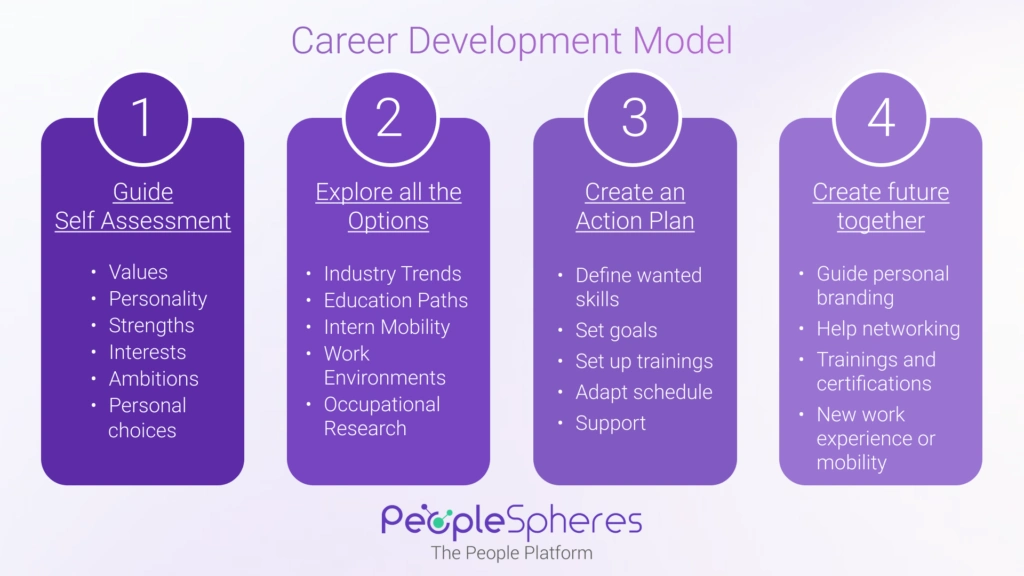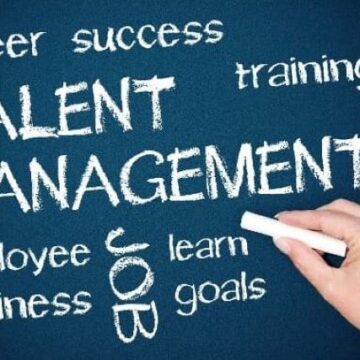
Nowadays, career management is becoming an essential tool for human resources and HR strategy. Indeed, this concept allows managers to get insights about the present and future skills within the company and the potential needs. For employees, career management is a powerful tool to get to know your skills, your professional goals, and what you want to learn in the near and distant future. Therefore, career management is a forward-looking approach to human resources management that supports change.
Related articles:
5 Tips to Promote the Professional Growth of Your Employees
5 Tips to Manage Careers and Mobility in Your Company
Career Management 101: the Basics
Career management is a participatory approach for all employees that requires involvement and commitment from the entire line of management. This approach thus makes it possible to reinforce the construction of a common company identity through actions involving all staff: reflection on professions and skills, future organizations, training needs, etc.
The challenge of career management is to put skills at the heart of management and to develop a governance of employment and skills. This management style is based on communication enabling agreements that will articulate company strategies and practices with the future of the employees.
Career management is broad but two main aspects can be drawn from it: a collective component and an individual component. The collective element helps to detect upstream issues related to changes in occupations, jobs, skills, staff and to anticipate the risks between needs and current resources on a qualitative and quantitative level. This element also defines ways to facilitate potential adjustments. The individual component will promote in advance skills development and employability of each employee within the company and their career options and path as a whole.
Setting Up Career Management in Your Company
In other words, how to organize your action plan. This step consists in implementing the various actions that will meet the needs identified above.
These actions include:
- training programs
- external recruitment and internal mobility processes
- annual and professional interviews
- mentoring and sponsorship programs

Once these actions are implemented, the results obtained will have to be observed and analyzed with the objectives of your career management approach. This will determine the relevance and performance of the means implemented. It will also allow you to anticipate future strategies.
Career Development and Mobility
Mobility is an instrument for employability and securing pathways. Mobility can take many forms (internal, external, ascending, geographical and lateral/transversal without change of hierarchical level). Its benefits are:
- versatility
- adaptability
- organizational knowledge
- prevention of deskilling
- development of flexibility
- enhancement of employability
To make it short, mobility is a great tool to support and develop your employees and their career.
However, mobility takes some organization to set up! Indeed, you should start by conducting mandatory professional interviews – at least every two years – with employees to interact with them about their career paths. Interview preparation is an important step too: prepare questions to explore career options, work-like-balance and every topic that sounds relevant in your one-on-one but most importantly make an individualized guide for the meeting. Then, jointly develop career paths with your employees and identify transferable skills. At this step, you can implement the concept of mobility to strengthen mobility areas, gateways that allow reconversions etc. Finally, formalize mobility and communicate about it! Whenever you receive reviews and notes, highlight them! This will definitely help people trust your mobility options.
Career Management Software
Go beyond traditional learning and development approaches by using technologies that reinvent training activities to enhance your employee career paths.Nowadays, some very cool tools exist to help you manage career and skills in your company!
Career management software supports organizations in guiding employees with their individual career development. These solutions supply HR with tools that follow employees’ progress, work-related skills, and experience to develop and most importantly retain internal talent. At the same time, career management solutions help employees develop their skills and identify career (and personal) goals.
Career management software offers opportunities for employee development, self-assessment, mobility management, predictive analytics, and reporting, and more. To support live or virtual career events—like training sessions, mentoring programs, or internal networking—integrating event check-in software can streamline attendance tracking, feedback collection, and participation metrics. Most modules can be centralized and managed through a unified interface: PeopleSpheres.
PeopleSpheres is an HR platform that gathers all your HR modules in one place. PeopleSpheres creates a unique and personalized management environment composed of various softwares by having a centralized interface for all the best-of-breed HR systems. This way, users can easily navigate between the different systems, without any complexities. PeopleSpheres HR dashboard is suitable to all industries, whether an organization is expanding internationally, growing bigger, or looking to modernize its’ HR management system.
Career Management: a Powerful Tool
It can be unclear how supervisors can actively participate in their employees’ career management and development. Effective career management ultimately means supporting the career progression of your employees: it is the role of managers to guide their employees in developing their own career paths and give them as many tools as possible to achieve their career goals.
Providing resources like an AI cover letter generator can assist employees in creating polished applications for internal mobility or external opportunities, making it easier for them to pursue advancement while staying engaged in their roles. After all, as their supervisor, you’re the best positioned to help create a plan focused on their needs and current skills.
Unfortunately, there is a popular belief among managers that employees will leave the company if they learn new skills and develop their career path. Therefore, some managers do not support advancement because they want great employees to remain on their team. But that actually is the perfect recipe for attrition: the best talent will definitely not stay in the same position indefinitely and being here to support them will pay off. It’s not time for farewell yet! Exploring career, transitions and credentials with an employee will not make them publish their resume and cover letter on LinkedIn and go to job interview right away, we promise! You will definitely support your employee’s growth and career by developing a career management plan.
Skills Management
One of the main goals of career management is to cope with changes in the world of work (organizational, technological, economic, social, legal, etc.) through the mapping of available resources such jobs, age, qualifications of each employee, and key skills.
Skills management and diagnosis can be done through various techniques but interviewing your employees is an essential first step. During this first meeting, we advise you to set up a personal sheet for every employee. This sheet should include a description of their job in its current state, the condition of exercise, the current tasks, and how they accessed their job. You can also include some background information: their previous job or internships, their diploma, etc. Then, you must communicate with your employees to plan the next steps of their careers. Indeed, you should definitely grasp what skills they want to learn, what new qualification or certification they want to get, what project they would be passionate about, their aspiration and what posts they aspire to!
Skills and career management gives you a strong advantage as a manager as you will have many insights on your employees career goal and vision. It also allows your employees to adapt their skills to the various disruptions in the sector, notably through the implementation of customized training programs. An important step to start would be to define a diagnostic of all skills and tools currently available within the organization, based on the meetings performed as explained above. Then, compare the resources available and what youneed to be successful in the market. With these interesting insights, you will be able to define a strategy to improve performance and competitiveness.
Importantly, managing careers this way will limit employees’ psychosocial risks, absenteeism, and turnover, by securing their career paths.
Planning Management
Skills management will definitely give you many insights and tools on what you can expect the future of your company to look like! With all the information you will collect, you can have a precise development plan including professional training, practical exercises, and simulations. This plan should be associated with a completion schedule.
Planning management has many positive effects for your company such as helping you guide your employees in adequation with the market and their career goals. It will also be much easier for you to commit to sustainable employment within the company and improve your employee turnover rate.
How Career Management Improves your Employee Wellness
Career management has significant advantages for employees. Fostering skills and career development allows employees to consider a sustainable career path within the organization. Being able to project yourself on the long term is both beneficial for the performance of the organization and also for the development of commitment and team loyalty. This optimization of careers and skills management contributes to employee’s satisfaction and quality of life at work. In addition, internal mobility is a good way to address skills needs in case of talent and job shortages.
Career management also helps improve employees’ employability and career development opportunities. Thus, the risk that they will face unemployment falls sharply. This aspect highly decreases stress and unsafety feeling among employees.
Furthermore, knowing exactly what your current skills are and what your future skills will be is valuing. This gives powerful knowledge to your employees and if you help them shape it into a concrete and fulfilling career development plan, they will be unstoppable! Communication and transparency, in both ways, are essential: this is all about creating a trusting relationship! This is not about negotiation and doing what’s best for your company nor sending your employee right into recruiters’ hands: this is about connecting with your employee and assisting them into creating a life-long fulfilling career plan.
Finally, you can improve quality of life at work by making sure each employee is supported to express themselves and be listened: create a safe space for them! To go further, take some time to develop your employer brand to attract new talent and make inclusion within the company easy for newcomers!
Conclusion
Human Resources make sure the human aspect is at the center of every business decision and we believe that skills and career management is a great way to support your employees. Basing your management on communication and transparency about careers will articulate your company strategies and practices with the future of the employees.
Career exploration and management helps you create a clear and prospective vision of resources in terms of staff, skills, and projects. Furthermore, implementing this concept during talent acquisition could be a smart move to make sure the person-organization fit is here since onboarding ! Therefore, you will know exactly the key functions you currently have and the ones you need. The identification of development actions: training plan, promotion, implementation of accompanying professional projects will give you many insights about the future of talents in your company.
Importantly, managing careers is a great way to improve employees life at work by limiting psychosocial risks, absenteeism and turnover, by securing their career pathways. Career management comfort your employees by guiding them to create a clear vision of their career and skills!




